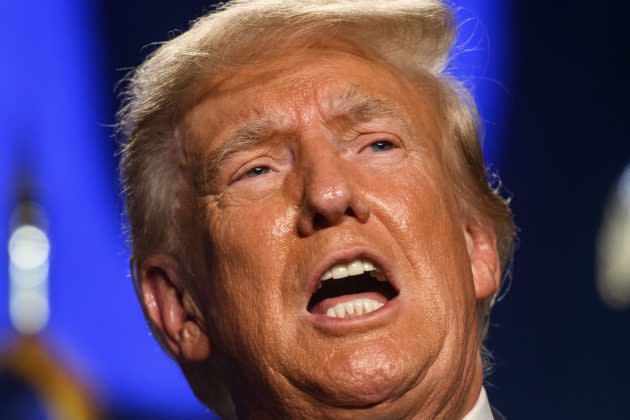Donald Trump ‘Did Nothing’ on Music Modernization Act, Key Attorney Behind Legislation Says, Despite His Claim That He Made Taylor Swift ‘So Much Money’

In an apparent attempt to undercut Taylor Swift’s potential influence on the presidential election later this year, former president Donald Trump issued a statement on his Truth Social platform Sunday claiming credit for the 2018 Music Modernization Act and stating, without evidence, that Swift would not endorse President Joe Biden’s re-election bid.
In the post, Trump claimed: “I signed and was responsible for the Music Modernization Act for Taylor Swift and all other Musical Artists. Joe Biden didn’t do anything for Taylor, and never will. There’s no way she could endorse Crooked Joe Biden, the worst and most corrupt President in the History of our Country, and be disloyal to the man who made her so much money. Besides that, I like her boyfriend, Travis, even though he may be a Liberal, and probably can’t stand me!”
More from Variety
Taylor Swift Arrives at Super Bowl With Blake Lively and Ice Spice
Drew Bledsoe Talks Taylor Swift Effect on NFL: 'I Think It's Been Entirely Positive'
A rep for Swift did not immediately respond to Variety‘s request for comment. However, Dina LaPolt, a key attorney behind the MMA, disputed Trump’s claims in a statement to Variety on Sunday.
“This [claim] is funny to me,” she wrote. “Trump did nothing on our legislation except sign it, and doesn’t even know what the Music Modernization Act does. Someone should ask him what the bill actually accomplished.”
While the full wording of the act, which was created to update the rights of songwriters and creators in the digital age, is available from the U.S. Copyright Office, a succinct summary can be found in a 2020 post on the Library of Congress website.
“Basically, the MMA changes the way songwriters and music publishers are paid statutory mechanical royalties [permission to reproduce and distribute recordings] when their work is streamed on interactive streaming services like Apple Music or Spotify, or sold on downloading services like Amazon Music,” the summary reads. “Beginning in 2021, a nonprofit entity designated by the Copyright Office, called the Mechanical Licensing Collective, or MLC, will collect and distribute these royalty payments to copyright owners of musical works matched to sound recordings in its database. And down the line, but no earlier than 2023, any unclaimed royalties can start being paid to copyright owners and songwriters of matched works according to each work’s market share. But to get paid, you will need to register your songs with the MLC.”
A bullet-point breakdown of the updates and improvements that the act instituted can be found here.
(In fact, the usually apolitical Swift has spoken out against Trump in the past, writing in Elle in 2019, “Invoking racism and provoking fear through thinly veiled messaging is not what I want from our leaders, and I realized that it actually is my responsibility to use my influence against that disgusting rhetoric.”)
Trump did indeed sign the act in 2018 — which had been passed unanimously by Congress after years of work by its proponents — politicizing the signing by doing so in a photo opportunity including such boosters as Kid Rock, the Beach Boys’ Mike Love, John Rich, the Doobie Brothers’ Jeff Baxter and others; Kanye West had been expected to attend but did not.
Regardless, the passage of the act was greeted with great enthusiasm by all corners of the music industry, as it updated a woefully obsolete copyright law that had been passed in 1998, long before the proliferation of streaming.
“The Music Modernization Act is now the law of the land, and thousands of songwriters and artists are better for it. The result is a music market better founded on fair competition and fair pay,” said Mitch Glazier, the president of the Recording Industry Association of America, among many other prominent commentators after the act was passed. “The enactment of this law demonstrates what music creators and digital services can do when we work together collaboratively to advance a mutually beneficial agenda. It’s a great day for music.”
Republican Congressman Darryl Issa, Chairman of the House Judiciary Subcommittee on Courts, Intellectual Property, and the Internet, wrote an op-ed for Variety in 2023 enthusiastically praising the act on its fifth anniversary, writing in part: “Congress achieved that rarest of things: A consensus solution that recognized the rights of musical artists and created a way they could be compensated fairly by publishers.”
Best of Variety
Sign up for Variety’s Newsletter. For the latest news, follow us on Facebook, Twitter, and Instagram.

